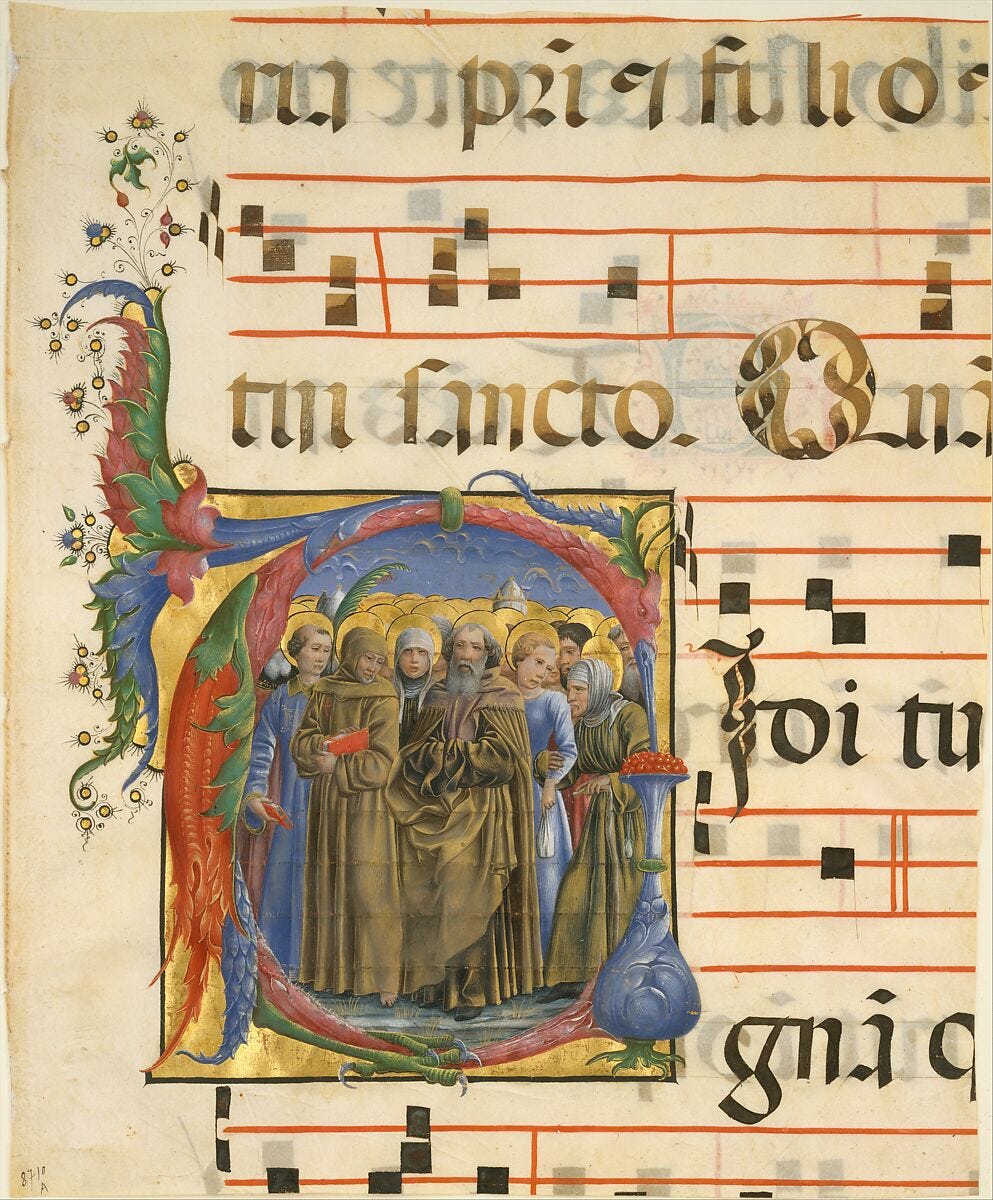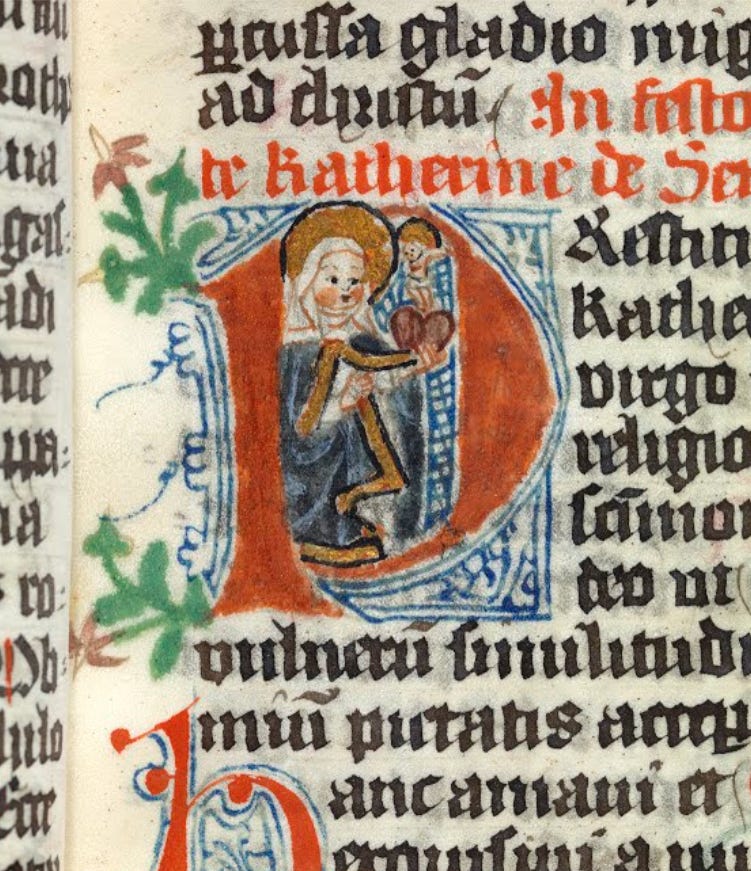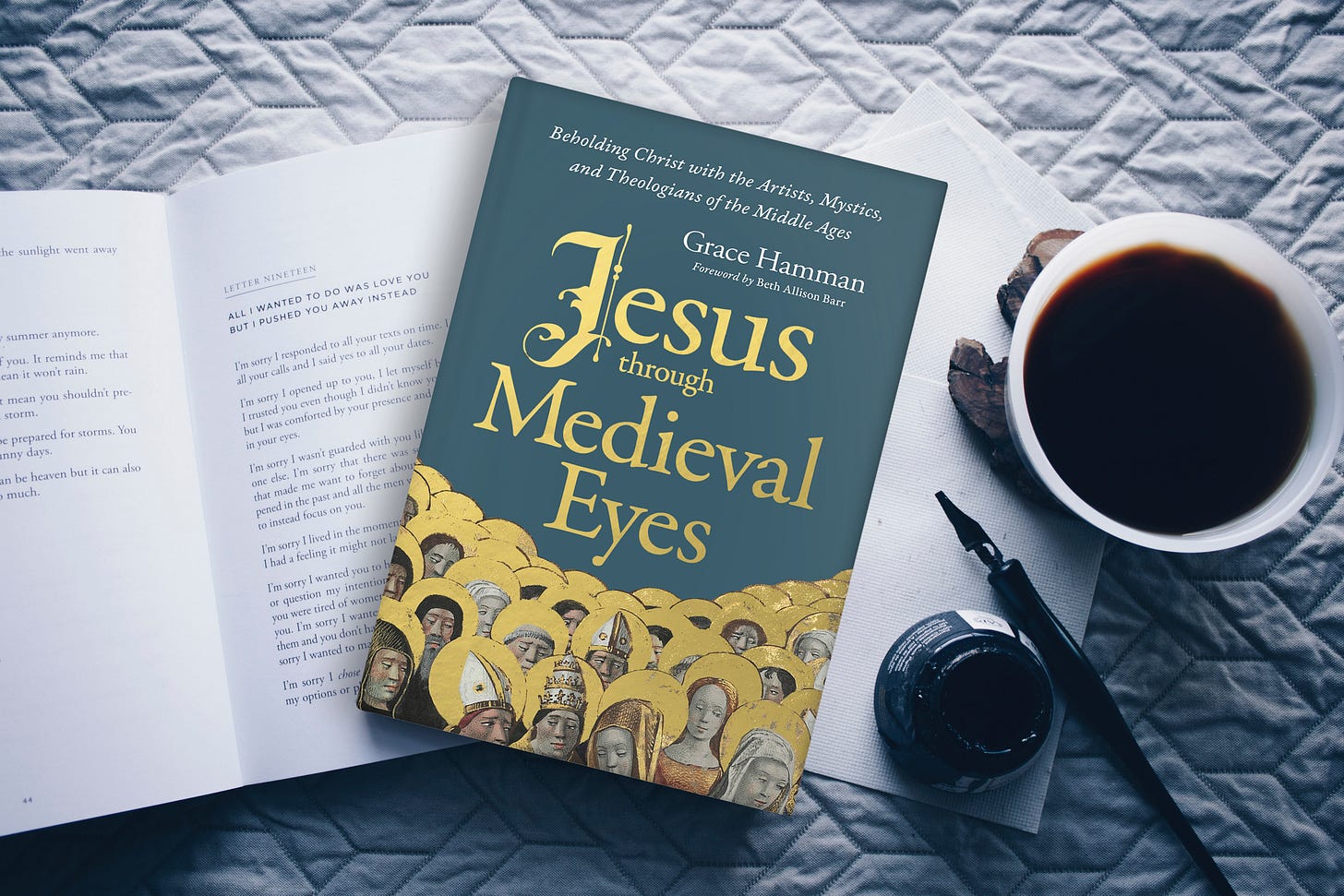Dear friend,
My preschooler has become obsessed with the printout of her school’s calendar of activities for the month. It has different clip art on it marking activities: Donuts with Dad, field trip to a farm, and so on. She loves to count the days: normal day, normal day, donuts. Normal day, normal day, fall break. Calendar is a forgettable word, so she calls it something better: a Map of Days.
Her Map of Days tells us that Halloween is coming up at the end of this month. This word is a contraction of All Hallows’ Eve, hallow being the ancient English word for saint. Hallowed be thy name, holy—do you see it now? All Hallows’ Eve is the night before All Saints’ Day (November 1), the day upon which the church has historically celebrated all the saints of the church. All Souls’ Day (November 2) follows, upon which we remember all the dear departed ones in our lives. I did not grow up in a Christian tradition that officially recognized saints, so all that was always rather confusing to me.
This set of holy days likely originated as commemoration of the martyrs of the early Church, though both have deep roots in pre-Christian Jewish and Pagan traditions of remembering the dead. In the ninth century, Pope Gregory IV assigned All Saints its official date of November first in the liturgical calendar.

I have been reading (on and off, a little bit goes a long way) the work of the German mystical writer, Mechthild of Hackeborn (1241-98). Mechthild lived at Helfta, the Saxon nunnery which was the home of some of the most fascinating women writing in the medieval contemplative tradition. From Barbara Newman, the editor of my copy of Mechthild, on the unique nature of Helfta: “Never again would medieval women write so prolifically in Latin or enjoy such a privileged religious life, supported by Dominican priests who helped to diffuse their work, yet did not control or censor what they wrote.”1
Mechthild was one of three famous woman writers who lived during this period at Helfta, the others being Mechthild of Magdeburg, a beguine who later settled at Helfta, and St. Gertrude of Helfta, Mechthild’s close friend. These women encouraged one another in their prayers and practices, and recorded one another’s experiences as well as their own. Gertrude, who was truly a remarkable woman, became abbess eventually, and encouraged education and frequent contemplative prayer. She was reported to repeat to the women under her spiritual care, “If zeal for learning were to perish… once they no longer understood the divine Scripture, religious devotion would perish too.”2
In this context, Mechthild of Hackeborn was known as a spiritual comforter to those around her and what we would now somewhat cringily call a “prayer warrior.” The amount of prayers she had memorized and taught was legendary. She was also chantress, which meant she directed the choir, taught the chant to novices, supervised the library and scriptorium, and in general was the font of all liturgical order and instruction. It cannot be surprising that her Book of Special Grace, composed by her sisters on Mechthild’s deathbed according to her witness to them, is partially organized by the liturgical year and deeply influenced by the music and form of Scripture in the liturgy.
Mecthild’s passage on All Saints’ Day is particularly beautiful. Transport yourself back eight hundred years or so, to an austere Cistercian nunnery in Saxony, where a group of veiled women sing together in praise. Mechthild, one of these women, is ashamedly running late to the service. She experiences a profound moment with Christ and the saints beyond the constraint of time and space:
With a mournful heart she offered her negligence to God. The Lord asked, “Don’t I seem to you to be worth enough to absolve all your debts?”
“Yes, indeed, Lord! I am sure that you could.”
Am I not of such priceless worth that I can supply and make up for all your sins of omission?”
“Yes, Lord, for I know nothing is impossible for you.”
“So I will make a full answer to God the Father for you in all things. You should also ask each company of saints to offer their merits for you. Let the patriarchs and prophets offer the desire they had for my incarnation. Let the apostles offer their faithfulness in remaining with me through all my trials and preaching throughout the world to gather me a faithful people. Let the martyrs offer their patience in shedding their blood for my love. Let the confessors offer their outstanding holiness in teaching others the way of life by word and example. Let the holy virgins offer the chastity and incorruption that made them worthy to be closest to me.”3
Desire, holiness, faithfulness, patience, holiness, chastity—all things freely offered for one another. Then, during Matins that feast day, Mechthild witnesses the Lord on his throne, Mary kneeling before. The saints dance and sing, threading around the throne and through the heart of Jesus in a complicated circling dance. They are loud like an organ:
From the hearts of the saints… came an exquisite sound like the music of organs. By this the Soul understood that they had not accomplished the least thing on earth—whether in praise and thanksgiving, in prayer, in actions, in words or even thoughts—that did not ring out from their hearts as eternal music to the praise of God and the increase of their joy and glory.4
What a vision of shared joy. It reminds me of Dante’s saints greeting one another in the fifth canto of Paradiso: “Here is now one who will increase our loves!”
But let’s turn back to Mechthild’s earlier words. Jesus is enough to absolve all debts, all failures, all distances, all sins. And he is more than willing, he is eager to do so. So why then turn to the dead but alive brothers and sisters in Christ, the saints, and ask them to share their joy and their goodness and their glory with oneself?
About a decade ago, I was pregnant with my first child. One of my stranger pregnancy symptoms was prenatal depression and anxiety. Mysteriously, this affliction destroyed my focus. My reading abilities were shot. I couldn’t follow a sermon or lecture because I had trouble listening. This was rather devastating to me both as a doctoral student and as someone whose entire personality has basically always been “reader.” I told a friend I felt like my brain had turned to stone. And honestly, the worst part was church.5 I couldn’t bear to sing hymns with meaningless language; I would fiddle with my fingers because the sermon meant little. I hated it so much. My only relief was taking the Eucharist, because I didn’t my brain to work to receive, I just needed to open my hands and then my mouth, like a baby bird.6
But others sang in the pews next to me. Others were listening to the word. I had always known how we could, as people following Christ, pray for one another (duh). But I took comfort in their singing, in their listening. I couldn’t bear to sing but I could listen. I noticed how the work of intercession extends beyond prayer, into worship, into thought, into presence, into all goodness. Few of those people ever knew, but it was true nonetheless. How could those folks have known they were also listening for me, because my brain was not processing language as it used to, due to its particular agonized response to the flood of hormones as my body knit together an infant? That they were singing for me while my mind was underwater?
Here’s the thing: This saintly intercession is not like your coworker covering an emergency shift for you at your crappy teen job at Cold Stone Creamery or else you’ll get fired by the big boss. Jesus did not need me to sing or pray or rejoice in that time of mental affliction. His enduring love is not contingent on my understanding or enthusiasm or my joy. So, this is where I immediately recognized Mechthild’s conversation with Jesus. I am enough for you, I don’t need this from you. But let others do it for you in your fear and pain, you will be blessed by them. There was such a gift for me in letting others sing for me, receive teaching for me. Such is the function of the body, as medieval writers mention time and time again when speaking of the Body of Christ on earth in its form of the church: when one hand has an open wound, the other hand will do the things it needs to do for it; when one eye is blind, the other will see for it; when one foot is broken, the rest of the body will realign for its sake. This is what should happen in a functioning body.7
I only noticed it in the faithful people present in the pews of my North Carolina church in the year of our Lord 2015. But what Mechthild reminds us is that this is true of the body now unseen in our present time, our present space.
All Saints and All Souls is the day that reminds us that you and I receive what the dearly departed share with us. Some traditions, like my own, believe this is ongoing and active in the prayers and intercession of the saints. Some believe that this only happens in the past. Either way, their care for us also lives in what they have left us in their words, art, buildings, gardens, and lives in our bodies that we have inherited from them. I mean, whose nose is the nose on my face? Of course it’s mine, but its shape was not originally mine. It’s an ongoing gift of access into the world of smell and taste from my parents and someone long before them.
It is such a comfort that others, dead or alive, can offer their patience, their worship, their desire in service to one other when we are in need. How beautiful that not only can someone pray for you, but offer their their most wonderful features about themselves, divine gifts, up for you as well? And that we can do that for one another!
Your Map of Days tells you when and where you are: you are held in love beyond time and place in the communion of saints. The dead sing and speak “tongued with fire beyond the language of the living,” pray, wrap their hard-fought wholeness and inherent belovedness like a blanket around us. This is not in substitution for salvific Divine Love or because that love is inaccessible. It is a gift of that Love in the unity of Christ.

What I’ve been up to this month:
I got to speak on Jesus as Mother at a women’s retreat in the Rockies. Not only were the leaves stunning, but my joy was so great in sharing Julian of Norwich and her love of Christ with these ladies!
Writing random things. Hoping sometime an essay or two here and there will reach the light of day.
The Old Books with Grace podcast is going strong. Last week, Thomas Ward shared on the Blessed John Duns Scotus, the “Subtle Doctor”!
joins me next week to chat about the women mystical writers of the Church and what they teach us today, Listen on Apple, Spotify, or the podcasting platform of your choice.
What I’ve been reading this month:
Nonfiction: My dad keeps giving me Evelyn Underhill books; she is his new obsession. I am about to crack one open!
Fiction: With my abundant Thriftbooks points, I have been re-acquiring L.M. Montgomery books that I haven’t read since childhood. I reread Chronicles of Avonlea… perfect for October days with a hint of chill and a cuppa.
Medieval/Medieval-adjacent: Mechthild.
Article: Plough’s recent Freedom issue was all-around stellar. Enjoyed it all the way through.
A Prayer from the Past
This month’s prayer is from the Anglican cleric Jeremy Taylor (1613-1667). Famed for his beautiful prose, Taylor was a Laudian cleric who quietly survived the Protectorate of Cromwell and later became a bishop. I found this prayer in my tiny, adorable, purple book of prayers, Prayers Ancient and Modern, collected and edited by Mary W. Tileston.
Almighty and eternal God, there is no number of Thy days or of Thy mercies: Thou hast sent us into this world to serve Thee, and to live according to Thy laws. O dear Lord, look upon us in mercy and pity: let Thy Holy Spirit lead us through this world with safety and peace, with holiness and religion, with spiritual comforts and joy in the Holy Ghost; that, when we have served Thee in our generation, we may be gathered unto our fathers, having the testimony of a holy conscience, in the confidence of a certain faith, and the comforts of a reasonable, religious, and holy hope, and perfect charity with Thee our God and all the world; that neither death nor life, nor angels nor principalities, nor powers, nor things present, nor things to come, nor height, nor depth, nor any other creature, may be able to separate us from the love of God, which is in Christ Jesus our Lord.
Amen.
Peace for your October,
Grace
P.S. Medievalish is free, and I’d be delighted if you shared it with a friend!

Mechthild of Hackeborn, The Book of Special Grace, introduced and translated by Barbara Newman (Paulist Press, 2017), 1.
Introduction, Book of Special Grace, 3.
Book of Special Grace, 108-9.
Book of Special Grace, 109.
I was out of coursework by that point, otherwise I think that would have been tied for the worst.
For curious folk, this circumstance was the start of a theological shift for me regarding the importance of the sacraments. Another tale for another time.
I am so sorry if you have been in a church that wasn’t functioning to help you in this way while you were in pain. This breaks my heart.



Beautiful and timely. As one named after St Catherine of Siena, that artwork illuminated my own in a very personal and special way. My Mum died 4 weeks ago today and I have found myself unable to participate in Mass, in church at all. The way you described others participating as an intercessory act for you was what I needed to hear as I have found this new state distressing. Thank you.
This is so lovely: It's heart-breaking in the best way: heart-opening. Thank you, Grace.